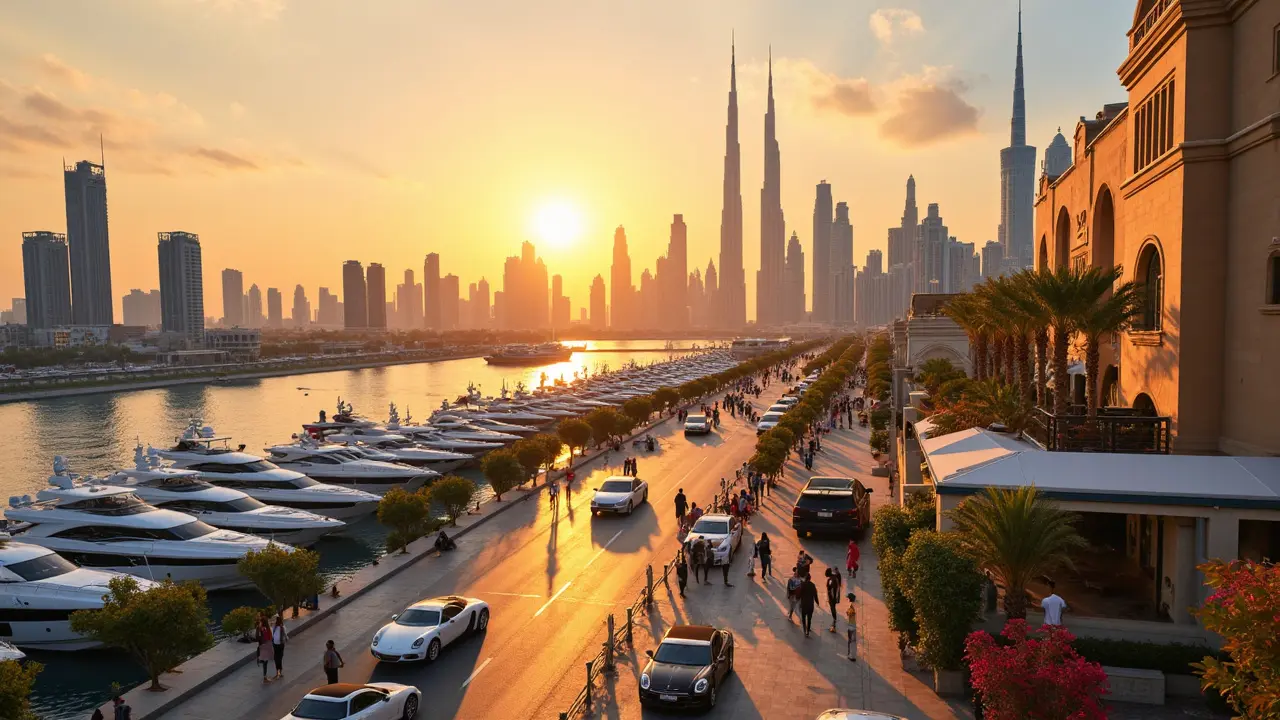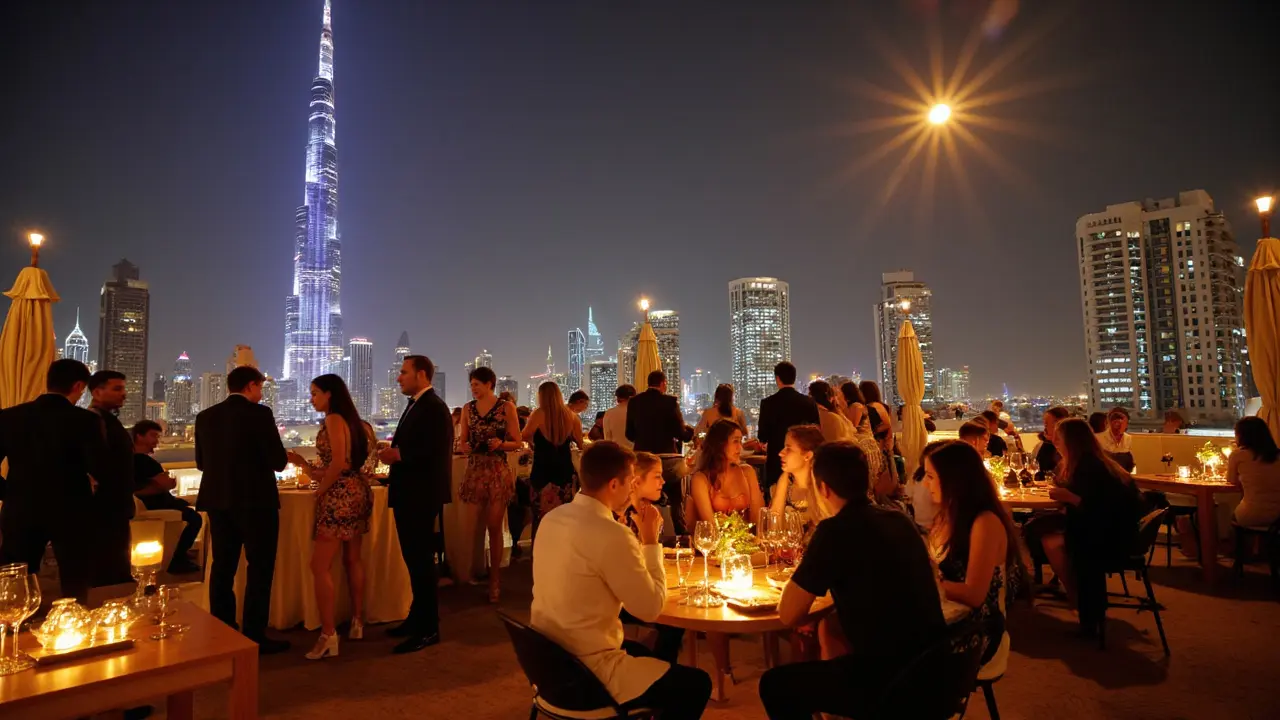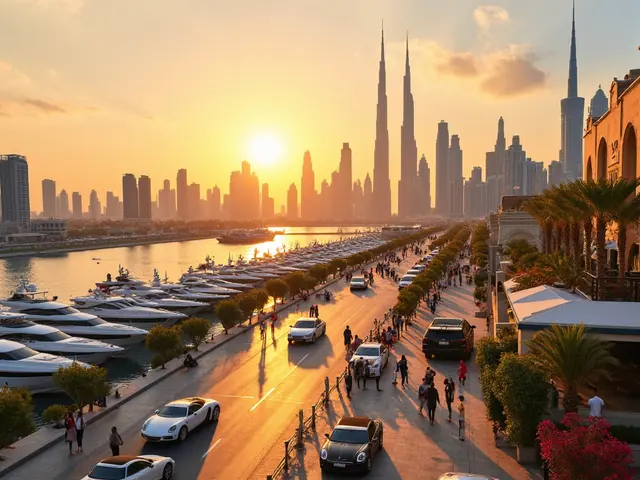Why Is Dubai Full of Millionaires? Exploring the Riches of the Middle East’s Wealth Hub

When you stroll down Dubai Marina’s palm-lined walks or cruise by the Burj Khalifa after dark, you can’t help noticing the parade of supercars, the endless designer shops, and the yacht parties that would make even Hollywood jealous. It almost feels unreal, like someone plucked a luxury commercial out of your dreams and dropped it in the middle of the desert. But here's the thing: Dubai really is full of millionaires, and we're not just talking the top floor of a fancy apartment block. Reports from 2023 estimated somewhere around 68,400 millionaires call the city home—and that number keeps climbing. How on earth did a patch of sand on the Persian Gulf end up as the playground of the one percent? Let’s unravel that cash-stuffed mystery.
The Formula Behind Dubai’s Millionaire Magnetism
First up, Dubai’s irresistible tax advantages. Imagine running a business in a place where you get to keep much more of your income—no personal income tax, no capital gains tax, and, for most businesses, zero corporate tax until you’re at a certain scale. That’s not a fantasy, that’s how Dubai operates. The UAE started rolling out a modest 9% corporate tax in 2023, but even with the change, the city’s setup is still a dream for anybody building (or hiding) wealth. No surprise, there’s a stampede of entrepreneurs, family offices, and crypto traders making Dubai their base. A few months in Dubai can save someone what a year in London or New York would cost in taxes alone.
Then there’s the strategic location. You’re pretty much a nonstop flight away from two-thirds of the world’s population. That means easy access to Europe, Asia, and Africa, so if you’re running an international business, supply chains make sense and meetings don’t need a week of travel. The city’s ports are record-breakers, with Jebel Ali ranking as the largest man-made harbor in the world. That trade-friendly vibe started back in the ‘70s when Dubai’s rulers realized oil wouldn’t last forever. Instead of just burning through their reserves, they built things like the Dubai International Financial Centre (DIFC)—a financial playground tailored for foreign banks, law firms, and investment companies to set up with minimal red tape.
Of course, it’s not all about bank accounts and boardrooms. Wealthy folks chase lifestyle too. Dubai offers pure spectacle: beach clubs, world-class golf, Michelin-starred restaurants, and shopping destinations where you can buy gold by the brick. The “wow” factor is real. If you like your life looking like Instagram 24/7, Dubai’s your place. And word travels fast—the city now draws not just financiers and oil heirs, but influencers, YouTubers, and brand ambassadors, each keen to cash in on the glitz.
Property in Dubai is another jaw-dropper. Foreigners can buy freehold real estate in certain zones, with high-rise flats, mansions by the beach, and even homes floating over the bay. In 2023, Dubai saw a record $90 billion worth of property sales, and nearly half involved overseas buyers—many shelling out millions upfront, sometimes without setting foot in the apartment before signing. The rental yields? Among the highest worldwide. It’s no wonder real estate developers keep adding more marble, more glass, more impossible scale, catering to buyers with pockets deeper than the Arabian Gulf.
But wealth in Dubai isn’t just about conspicuous consumption. There’s a sharp focus on safety, too. Crime rates hover among the world’s lowest, thanks in part to strict laws and a watchful government. You’re perfectly safe walking around with a designer bag at 3am—something not every major city can promise. That peace of mind, mixed with the city’s extreme efficiency and futuristic infrastructure, grabs the attention of families from London, Hong Kong, or Moscow looking for a “safe haven” to ride out global uncertainties. During the pandemic, Dubai became the go-to “escape city” for people with means, launching a visa specifically for remote workers in 2021.
Ever wonder about the kind of people who move here? Sure, plenty of old money from the Gulf, but you’ll bump into Russian tech whizzes, Indian startup founders, South African property moguls, and British retirees all mixing at the same rooftop lounge. The diversity is wild, and Dubai’s regulations actually encourage newcomers through programs like the Golden Visa (for high earners and investors) and the entrepreneur-focused “sandbox” permits. Since 2019, more than 150,000 Golden Visas have been issued, and the application pace is only accelerating. If you’ve got the bank balance, Dubai basically rolls out the red carpet.
But making your fortune in Dubai does come with a unique set of quirks. The rules are strict—no big public displays of affection, very little open criticism of the government, and don’t even think about chewing gum outside in some places. Plus, the luxury can get exhausting. Some expats joke that you need a personal assistant just to manage the invitations to galas, charity balls, and VIP launches. But hey, if you’ve traded in your rainy British weekends for a sun-soaked rooftop and a supercar on tap, most call that a good deal.
One thing millionaires genuinely praise? The ease of doing business. Setting up a company in most cities takes months—Dubai does it in days. You’ve got free zones where companies can have 100% foreign ownership, with zero customs duty and one-stop licensing. Plus, there’s little of the bureaucratic headache found in supposedly “easy” Western cities. If you want to import luxury watches, run an events company, or launch a software startup, it often takes just a morning with the right paperwork to go live.
Education and healthcare aren't afterthoughts. Families moving to Dubai for work find international schools with British, American, French, and even Indian curriculums, plus high-end medical care that matches anything you’d get in Europe—sometimes with less waiting and more glam. That makes relocating kids and spouses far easier than the jet-set lives elsewhere demand.
Networking in Dubai is practically an Olympic sport. The city revolves around club memberships, networking breakfasts, and endless business events. You’ll meet future partners over a round of golf in Emirates Hills, pitch venture capitalists at DIFC, or end up buying real estate over lunch in Jumeirah. It’s not what you know but who you bump into at brunch, and many a multi-million-pound deal started life with just a chance encounter here.
If you’re thinking about turning your Dubai holiday into something more—a full-blown residency, maybe even setting up shop—here’s a tip: research the different types of visas and free zones. Not every area offers the same perks, and some require a specific minimum spend or business setup. The government moves fast, but the devil is in the paperwork details. And since rules update quickly (like the 2023 change on corporate taxes), having a specialist or a relocation advisor on speed dial can save you serious headaches.

From Pearl Diving Village to Millionaire Playground: Dubai's Wealth Transformation
Let’s rewind to the early 20th century—Dubai was a sleepy fishing and pearl-diving port, more camels than Lamborghinis. The real gold rush only started with a combination of oil revenues (which, fun fact, still make up less than 1% of the local economy today) and clever city planning by the ruling Al Maktoum family. They didn’t just wait for oil riches to run out—they became pioneers in turning Dubai into an oasis for global trade, tourism, and finance.
The vision paid off. By the late ‘90s, the construction boom was in overdrive—Burj Al Arab, Palm Jumeirah, and the world-famous Burj Khalifa set the city’s new standard: go big, go bold. Foreign investors flooded in, lured by the relaxed ownership laws and “if you can dream it, we’ll build it” attitude. Where else in the world do you find air-conditioned bus stops or man-made islands shaped like the world map?
World-class events seal the deal. From the Dubai World Cup (the richest horse race on the planet) to the Dubai Shopping Festival and international art fairs, the city positions itself as a global stage. Celebrities, sports legends, and royalty mix in with the wealthy crowd, all drawn by the spectacle. That media spotlight feeds a feedback loop: Dubai looks wealthy on social media, so more millionaires visit, then invest, then settle. It's a brand as much as a destination.
But here’s something you might miss if you just focus on the flash: Dubai’s wealth isn’t just from oil, property, or even international business. There’s a strong undercurrent of successful small and midsize entrepreneurs—think logistics, tech, marketing, and healthcare—building empires outside the limelight. These everyday millionaires might not get the viral press, but they’re the backbone of the city’s economy, and they stick around for the same reasons as the headline-grabbing billionaires: safety, opportunity, a truly global network, and a high standard of living.
Even Dubai’s government has leaned into this with smart planning. Initiatives like the Dubai Future Foundation and the Expo 2020 campus attract inventors, green-tech startups, and creative talent. There’s a talk around town that the next major billionaire might not come from oil or retail—but from AI, renewables, or space tech. If you’re a big dreamer with a killer idea, this city wants you.
While you’ll always hear about the glitz, it’s the infrastructure and ease of life that keep rich families coming back (and bringing their friends). The city is wired for convenience—one-card public transport, mobile payments everywhere, digital health appointments, and, yes, luxury delivery for pretty much anything. Even government paperwork is mostly online and pain-free. If there’s a space where life is more “plug and play” at the top end, I haven’t seen it.
It’s not perfect. Sandstorms, summer heat pushing 50°C, and the occasional culture shock for Westerners adjusting to local norms and laws—that’s all part of the deal. But the positives keep outweighing the quirks. Dubai’s secret sauce isn’t just money; it’s the ambition, friendliness, and infectious sense that big things can happen fast if you’ve got the drive (and let’s be honest, a bit of cash doesn’t hurt).
With the world shifting, currencies wavering, and more people operating cross-border than ever, Dubai is poised to keep its lead as the millionaire capital of the Middle East. If anything, expect the numbers to keep rising. Where else will you find pop stars shopping next to venture capitalists, social media stars brunching beside energy tycoons, and British retirees comparing golf handicaps with crypto whizzes?
So, what turns a city built on fishing huts into the world’s flashiest millionaire magnet? Mix smart policies, relentless PR, lifestyle you can’t buy anywhere else, and a truly international community that feels like a passport to the future. That’s how Dubai did it—and why its legend only grows.

Want to Join the Dubai Millionaire Club? How to Get Started Like a Local
You don’t have to be a billionaire to get a taste of Dubai’s golden life. Here’s what the smart money does to slip into Dubai’s rich scene without getting lost—or fleeced—on arrival.
- Dubai millionaires love research. Before you jump, visit during the shoulder seasons (March–April or October–November) when it’s warm but not unbearable. Scope out different neighborhoods—from the skyscrapers of Downtown to the laidback villas of Arabian Ranches—to find your vibe.
- Get your visa sorted before you move. Golden Visas are now easier than ever if you buy property worth AED 2 million (about £430k) or show you’ve got a business that adds value to the emirate. There are also “retiree” and “remote work” options for digital nomads and freelancers.
- Choose your bank wisely. Local banks are slick, but HSBC, Citibank, and Standard Chartered all have international branches for easy money transfers. You’ll need proof of address, a residency visa, and sometimes a sponsor, so start paperwork early.
- Looking at buying property? Hire a RERA-certified agent who knows the ins and outs of Dubai’s freehold zones. The prime spots—Palm Jumeirah, Jumeirah Lake Towers, Emirates Hills—aren’t just beautiful, they’ve got the best investment returns.
- If you’re in business, check if your company idea suits a free zone—the DIFC is the gold standard for finance, while Dubai Media City is hot for creative industries. Each free zone has its own rules, so compare setups before registering.
- Schooling is first class, but spots fill up fast. If you’ve got young kids, get your paperwork lined up and register early at international schools. Many offer tours (just like British prep schools), and word spreads quickly among expat parents about the good and not-so-good places.
- Don't sleep on networking. Join expat clubs, professional organizations, or even sports teams. Dubai is built on connections—sometimes the most lucrative partnerships are born on a padel court, not in a suit-and-tie meeting.
- Get familiar with the law. Drinking is legal (in licensed venues), but public drunkenness isn’t. Always stay respectful and check local customs before heading out—especially during Ramadan or big public holidays.
- Settling in? Embrace the convenience. Download the main government apps, sign up for grocery and delivery services, and use Nol cards for quick public transport. Life in Dubai is smoother than most European capitals, once you know where to look.
- Ready to soak in the lifestyle but not sure about the commitment? Test out a month-long stay in a serviced apartment in JBR or a short-term rental near Kite Beach; you’ll get a real feel for the city before making any big investments.
Dubai’s millionaire scene isn’t a secret society—it’s more like a giant welcome party if you play by the rules, respect the culture, and know how to stand out without sticking out. For anyone chasing sun, security, and endless opportunity, there’s almost nowhere quite like it.

